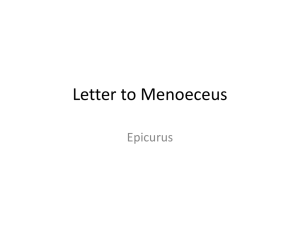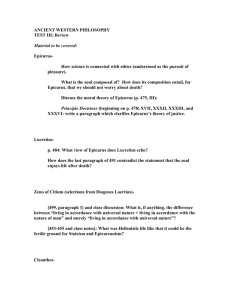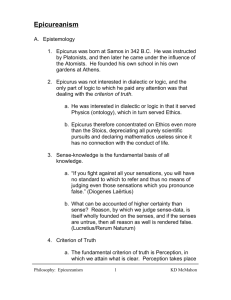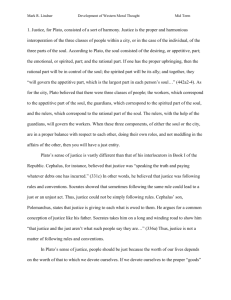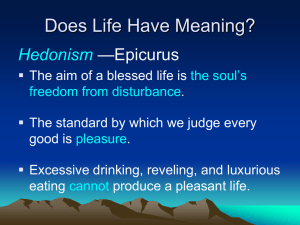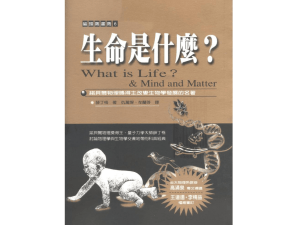Loyola University
advertisement
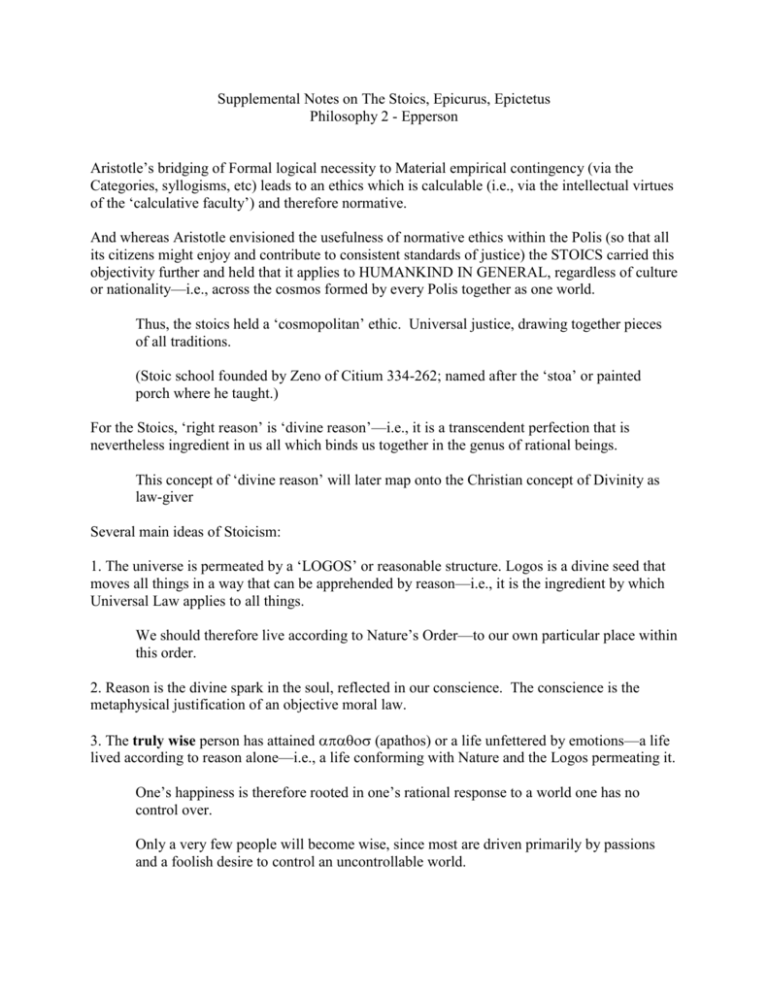
Supplemental Notes on The Stoics, Epicurus, Epictetus Philosophy 2 - Epperson Aristotle’s bridging of Formal logical necessity to Material empirical contingency (via the Categories, syllogisms, etc) leads to an ethics which is calculable (i.e., via the intellectual virtues of the ‘calculative faculty’) and therefore normative. And whereas Aristotle envisioned the usefulness of normative ethics within the Polis (so that all its citizens might enjoy and contribute to consistent standards of justice) the STOICS carried this objectivity further and held that it applies to HUMANKIND IN GENERAL, regardless of culture or nationality—i.e., across the cosmos formed by every Polis together as one world. Thus, the stoics held a ‘cosmopolitan’ ethic. Universal justice, drawing together pieces of all traditions. (Stoic school founded by Zeno of Citium 334-262; named after the ‘stoa’ or painted porch where he taught.) For the Stoics, ‘right reason’ is ‘divine reason’—i.e., it is a transcendent perfection that is nevertheless ingredient in us all which binds us together in the genus of rational beings. This concept of ‘divine reason’ will later map onto the Christian concept of Divinity as law-giver Several main ideas of Stoicism: 1. The universe is permeated by a ‘LOGOS’ or reasonable structure. Logos is a divine seed that moves all things in a way that can be apprehended by reason—i.e., it is the ingredient by which Universal Law applies to all things. We should therefore live according to Nature’s Order—to our own particular place within this order. 2. Reason is the divine spark in the soul, reflected in our conscience. The conscience is the metaphysical justification of an objective moral law. 3. The truly wise person has attained apathos) or a life unfettered by emotions—a life lived according to reason alone—i.e., a life conforming with Nature and the Logos permeating it. One’s happiness is therefore rooted in one’s rational response to a world one has no control over. Only a very few people will become wise, since most are driven primarily by passions and a foolish desire to control an uncontrollable world. 2 4. A life conforming with Nature means that some things are morally neutral and shouldn’t bother a truly wise person. A wise person is thus truly self-sufficient, using one’s wisdom to govern one’s responses to various experiences such that one always has self-control and always understands one’s limitations re: what one can change. A wise person meets these limitations with apathy). 5. The moral good is the highest and even ‘only’ Good there is. 6. Nature IS God and God IS Nature. Stoics embrace a pantheistic worldview. 7. The Stoics schools were interested in producing ways of life, not just philosophy. Common themes among the various Stoic Schools: 1. The Highest Good is Happiness 2. One must apply Reason to life in order to secure happiness; reason allows one to recognize fate (via the laws of nature) and thus ‘make our own luck’ as we deal with the contingent world. Education of self and community is thus extremely important. 3. The Stoics strive to remain unaffected by the contingent world as they focus instead on the Real World as given by Logos. Nevertheless, they recommend living according to the unavoidable features of the contingent world, such as social classes (slave, master, etc)—again, to recognize what is unchangeable and to be apathetic towards these things. 4. Live according to Nature. Fairly egalitarian, since all human beings can reason (even though most choose not to and instead live their lives governed by their passions.) Epicurus The philosophy of Epicurus (341–270 B.C.) was a complete and interdependent system, involving a view of the goal of human life (happiness, resulting from absence of physical pain and mental disturbance), an empiricist theory of knowledge (sensations, including the perception of pleasure and pain, are infallible criteria), a description of nature based on atomistic materialism, and a naturalistic account of evolution, from the formation of the world to the emergence of human societies. Epicurus believed that, on the basis of a radical materialism 3 which dispensed with transcendent entities such as the Platonic Ideas or Forms, he could disprove the possibility of the soul's survival after death, and hence the prospect of punishment in the afterlife. He regarded the unacknowledged fear of death and punishment as the primary cause of anxiety among human beings, and anxiety in turn as the source of extreme and irrational desires. The elimination of the fears and corresponding desires would leave people free to pursue the pleasures, both physical and mental, to which they are naturally drawn, and to enjoy the peace of mind that is consequent upon their regularly expected and achieved satisfaction. It remained to explain how irrational fears arose in the first place: hence the importance of an account of social evolution. Epicurus was aware that deeply ingrained habits of thought are not easily corrected, and thus he proposed various exercises to assist the novice. His system included advice on the proper attitude toward politics (avoid it where possible) and the gods (do not imagine that they concern themselves about human beings and their behavior), the role of sex (dubious), marriage (also dubious) and friendship (essential), reflections on the nature of various meteorological and planetary phenomena, about which it was best to keep an open mind in the absence of decisive verification, and explanations of such processes as gravity and magnetism, which posed considerable challenges to the ingenuity of the earlier atomists. Although the overall structure of Epicureanism was designed to hang together and to serve its principal ethical goals, there was room for a great deal of intriguing philosophical argument concerning every aspect of the system, from the speed of atoms in a void to the origin of optical illusions. Psychology and Ethics Having established the physical basis of the world, Epicurus proceeds to explain the nature of the soul (this, at least, is the order in which Lucretius sets things out). This too, of course, consists of atoms: first, there is nothing that is not made up of atoms and void (secondary qualities are simply accidents of the arrangement of atoms), and second, an incorporeal entity could neither act on nor be moved by bodies, as the soul is seen to do (e.g., it is conscious of what happens to the body, and it initiates physical movement). Epicurus maintains that soul atoms are particularly fine and are distributed throughout the body (LH 64), and it is by means of them that we have sensations (aisthêseis) and the experience of pain and pleasure, which Epicurus calls pathê (a term used by Aristotle and others to signify emotions instead). Body without soul atoms is unconscious and inert, and when the atoms of the body are disarranged so that it can no longer support conscious life, the soul atoms are scattered and no longer retain the capacities for sensation (LH 65). There is also a part of the human soul that is concentrated in the chest, and is the seat of the higher intellectual functions. The distinction is important, because it is in the rational part that error in judgment enters in. Sensation, including that of pain and pleasure, is incorrigible just because it is a function of the non-rational part, which does not modify a perception — which itself is the passive and pure reception of lamina emitted from macroscopic bodies — by the addition of opinion or belief. The corporeal nature of the soul has two crucial consequences for Epicureanism. First, it is the basis of Epicurus' demonstration that the soul does not survive the death of the body (other arguments to this effect are presented in Lucretius 3.417–614). The soul's texture is too delicate to exist independently of the body that contains it, and in any case the connection with the body is necessary for sensation to occur. From this it follows that there can be no punishment after death, nor any regrets for the life that has been lost. Second, the soul is responsive to physical 4 impressions, whether those that arrive from without in the form of laminas or simulacra, or those that arise from internal motions of the body. No phenomena are purely mental, in the sense of being disembodied states or objects of pure consciousness conceived as separate from embodiment. The elementary sensations of pleasure and pain, accordingly, rather than abstract moral principles or abstract concepts of goodness or badness, are the fundamental guides to what is good and bad, since all sentient creatures are naturally attracted to the one and repelled by the other. The function of the human mind — that part of the soul located in our chest — is not to seek higher things, but to maximize pleasure and minimize pain. That is its entire objective; the risk (a substantial one) is only that it may miscalculate, since it is subject to false beliefs and errors in cognitive processes. Unlike other Hellenistic schools, such as those of Aristotle and the Stoics, the Epicureans were not greatly interested in formal logic, but they certainly needed a theory of the formation of beliefs. As far as the ideational content of thinking — that is, the thought of something — is concerned, Epicurus proposed a radically reductive hypothesis: just as sensations occur as a result of thin films emitted by objects that enter the appropriate sense organ, so too some of these simulacra are fine enough to penetrate directly to the mind (located in the chest), and that is how we imagine such objects. This process is invoked to explain not only dream images, but any kind of mental impression, including impressions constituting voluntary thought: the latter occurs when we attend to one or another of the exiguous physical films that are continuously floating through the air. (How we manage to attend voluntarily to whichever of these films we choose is not explained in the surviving sources.) Imagining a thing is thus nothing more than picking out the simulacra that have been emitted by it, and which may endure beyond the life of the thing itself (hence we can imagine the dead). These mental images have no privileged status, such as Plato gave to his noetic Ideas or Forms; they are always true, but in this do not differ from the information provided by the senses. Mistakes occur here too when the wrong beliefs are associated with such impressions, for example, that because we have a mental image of a dead person it follows that he or she still exists in a ghostly form. Epicurean physics proves that this is impossible. A great barrier to correct thinking is language itself, which, because it has a name for death, may suggest that death (being dead) is something a person can experience and hence deserves to be feared. Words must be understood in their basic sense, Epicurus says, as opposed to what he calls “empty sounds” (LH 37). The culprit in misunderstanding is always an illegitimate inference from sensation (the latter including thoughts produced by film-like images). An example is the belief that centaurs exist. Epicurus does not deny that the thought of a centaur corresponds to some real stimulus in the form of simulacra: his theory of knowledge commits him to the view that it must. But the flimsy laminas as they float through the air can become distorted or interfere with one another, and thus the upper part of a human figure may get loosely attached to the lower part of a horse's. We know that this is unreal because such a combination is physically impossible: horses and human beings mature at different rates, for example, and eat different foods (see Lucretius 5.878–91; cf. Palaephatus On Incredible Tales 20). Beliefs about whether sensations correspond to an actually existing thing must be tested against knowledge of the world, as informed by Epicurean theory. 5 The ability to reason or calculate (logismos) cannot be a function of images. It is the faculty that lets us infer by analogy from the visible world to the invisible, and also that with which we may recognize that not all pleasures are to be chosen at all times, since some immediate pleasures may lead to long-term pain or harm (Letter to Menoeceus = LM 129). What is more, one must know something about the nature of pleasure in order to pursue it rationally, and likewise for pain. Epicurus, it appears, uses the terms pleasure and pain (hêdonê, algêdôn) strictly in reference to physical pathê or sensations, that is, those that are experienced via the non-rational soul that is distributed throughout the body. As for the rational part or mind, we have positive and negative experiences through it too. Most prominent among the negative mental states is fear, above all the fear of unreal dangers, such as death. Death, Epicurus insists, is nothing to us, since while we exist, our death is not, and when our death occurs, we do not exist (LM 124–25); but if one is frightened by the empty name of death, the fear will persist since we must all eventually die. This fear is one source of perturbation (tarakhê), and is a worse curse than physical pain itself; the absence of such fear is ataraxy, lack of perturbation, and ataraxy, together with freedom from physical pain, is one way of specifying the goal of life, for Epicurus. There are also positive states of mind, which Epicurus identifies by the special term khara (joy), as opposed to hêdonê (pleasure, i.e., physical pleasure). These states too depend on belief, whether true or false. But Epicurus does not treat khara as an end, or part of the end for living: rather, he tends to describe the goal by negation, as freedom from bodily pain and mental disturbance (LM 128). However, happiness (eudaimonia), according to Epicurus, is not simply a neutral or privative condition but rather a form of pleasure in its own right — what Epicurus called catastematic or (following Cicero's Latin translation) “static” as opposed to “kinetic” pleasure. Although the precise nature of this distinction is debated, kinetic pleasures involve the return to a stable or healthy state, e.g., the pleasurable elimination of hunger or thirst. As the need is met, however, the pleasure associated with replenishment diminishes: one does not enjoy eating for replenishment when full. To maximize this kind of pleasure, one would have to increase rather than limit one's wants. This was the view adopted by the philosophical school known as the Cyrenaics, who advocated increasing desires and seeking ever new ways of gratifying them, so that the pleasure of replenishment could continue past the point where most people would feel satiated, and be available at every moment. Epicurus objected that such pleasures are necessarily accompanied by distress, for they depend upon a lack that is painful (Plato had demonstrated the problematic nature of this kind of pleasure; see Gorgias 496C–497A, Philebus 31E–32D, 46A–50C). In addition, augmenting desires tends to intensify rather than reduce the mental agitation (a distressful state of mind) that Epicurean philosophy sought to eliminate. Catastematic pleasure, on the contrary, is (or is taken in) a state rather than a process: it is the pleasure that accompanies well-being as such. The Cyrenaics and others maintained that this condition is not pleasurable but rather neutral — neither pleasurable nor painful. In addition, there was a question concerning the relationship between the two types of pleasure: does catastematic pleasure begin only when kinetic pleasure ends, or does it gradually increase as the need is met, and the pleasure of replenishment diminishes? If the latter, it would appear to involve process as well, as opposed to being a purely stable condition. It is unclear just how the Epicureans responded to these objections. 6 For Epicurus, there are some fears that are perfectly legitimate (though they would not be agitated and upsetting); so too are some desires. Epicurus offers a classification of desires into three types: some are natural, others are empty; and natural desires are of two sorts, those that are necessary and those that are merely natural (see Cooper 1999). Natural and necessary are those that look to happiness, physical well-being, or life itself (LM 127). Unnecessary but natural desires are for pleasant things like sweet odors and good-tasting food and drink (and for various pleasurable activities of sorts other than simple smelling, touching and tasting). Empty desires are those that have as their objects things designated by empty sounds, such as immortality, which cannot exist for human beings and do not correspond to any genuine need. The same holds for the desire for great wealth or for marks of fame, such as statues: they cannot provide the security that is the genuine object of the desire. Such desires, accordingly, can never be satisfied, any more than the corresponding fears — e.g., the fear of death — can ever be alleviated, since neither has a genuine referent, i.e., death as something harmful (when it is present, we do not exist) or wealth and power as salves for anxiety. Such empty fears and desires, based on what Epicurus calls kenodoxia or empty belief, are themselves the main source of perturbation and pain in civilized life, where more elementary dangers have been brought under control, since they are the reason why people are forever driven to strive for limitless wealth and power, subjecting themselves to the very dangers they imagine they are avoiding. Although human beings, like everything else, are composed of atoms that move according to their fixed laws, our actions are not wholly predetermined — rather than entertain such a paralyzing doctrine, Epicurus says, it would be better to believe in the old myths, for all their perversities (LM 134). What enables us to wrest liberty from a mechanistic universe is the existence of a certain randomness in the motion of atoms, that takes the form of a minute swerve in their forward course (evidence for this doctrine derives chiefly from later sources, including Lucretius and Cicero). It is not entirely clear how the swerve operates: it may involve a small angle of deviation from the original path, or else a slight shift sideways, perhaps by a single minimum, with no change in direction. The idea of such a minute veering, said to occur at no determinate time or place, is less strange in the modern age of quantum physics than it was in Epicurus' time, and it gave rise to mocking critiques. More problematic today is how the swerve might explain freedom of will — if indeed Epicurus' idea of the will was like our own. It did, at all events, introduce an indeterminacy into the universe, and if soul atoms, thanks to their fineness, were more susceptible to the effects of such deviations than coarser matter, the swerve could at least represent a breach in any strict predestination of human behavior. And this might have been enough for Epicurus' purposes: he may not have invoked the swerve in order to explain voluntary action (claiming that it is action deriving, immediately or ultimately, from a swerve or some swerves of the soul's atoms). He may have wished merely to establish the possibility of action not deriving from the positions of the soul's constituent atoms at any time plus the effects of collisions among them resulting from their given movements at that time. According to Lucretius (2.225–50), the swerve was also put to use to solve a cosmological problem: if at some (as it were) initial moment all atoms were moving uniformly in a single direction (downward) at the same speed, it is impossible to conceive how the process of atomic collisions could have begun, save by some such device. This seems a curious idea: given that time, like space, was infinite according to Epicurus, he need not have imagined a time prior to collisions. Just possibly the tendency of atoms to emerge from collisions in a preferred direction (by definition “down”) might lead over time to local regions of parallel motion, and the swerve 7 could serve to reintroduce contact among them. In any event, Epicurus may have thought of atoms moving in some uniform direction rather than in diverse ones as a default position for physical theory (because of the simplicity of that hypothesis); thus he may have felt the need to explain how the diversity of the atoms' motions could have arisen. Epicurus (341-271): “Letter to Menoeceus” In addition to the above, some key points: 1. Why the fear of death is irrational. 2. “Refer all choice and avoidance to the health of the body and (the soul’s) freedom from disturbance” i.e., Happiness is achieved by using reason to avoid pain and fear. Pleasure is the key, since pain is defined as lack of pleasure. Pleasure is the ‘beginning and end of the blessed life’ and ‘the standard by which we judge every good.’ Reason lets us order and rank our pleasures. ‘Good’ pleasure is sometimes bad, ‘bad’ pleasure is sometimes good, etc. Some pains due to ‘want’ can be reasoned away so that bread and water can bring as much pleasure as a luxurious meal, since the pleasures of the latter can be dismissed largely as the satiation of unreasonable wants. (Simple hunger, i.e., is a ‘reasonable want’ and its satiation is a reasonable pleasure.) This is living ‘prudently’; so prudence is thus the key to a happy life. It is impossible to be unhappy if one lives prudently. 5. It is better that a well reasoned action should fail than an ill reasoned action succeed because of chance. 6. Worshipping the gods is not unreasonable, since the alternative of strict natural philosophy entails strict determinism from which entails pains we cannot ever avoid; whereas belief in the gods leaves room for hope via prayer. Epictetus Epictetus, who was a native of Phrygia, is known by a name which means "newly acquired," because he was a slave of Epaphroditus in the court of Rome during the reign of the emperor Nero (54-68 CE). The early Christian, Origen, quotes an account by Celsus about Epictetus and the greatness of his words under suffering similar to that of Jesus. Celsus wrote, "Take Epictetus, who, when his master was twisting his leg, said, smiling and unmoved, 'You will break my leg;' and when it was 8 broken, he added, 'Did I not tell you that you would break it?'" Epictetus spent the rest of his life with a crippled leg. While a slave Epictetus managed to attend lectures of the Stoic philosopher, Musonius Rufus, who made his listeners feel that they were personally being accused. Epictetus gained his freedom and was expelled from Rome by the emperor Domitian about 90 CE with other philosophers suspected of republicanism. Epictetus settled in Nicopolis in Greece where he lived in poverty with only "earth, sky, and a cloak." Epictetus lived and taught a long time and probably died late in the reign of Hadrian (117-138). Among his students coming from various parts of the empire was Flavius Arrian, who became a consul under the emperor Hadrian and wrote a history of Alexander the Great. Arrian collected the teachings of Epictetus into eight books of DISCOURSES, the first four of which survive, and a brief compendium of these teachings called the ENCHEIRIDION or MANUAL OF EPICTETUS. Epictetus (130-50): “Enchiridion” 1-2. Be concerned only with what is in your power. Use reason to distinguish between appearance and reality when it comes to motivation by things which SEEM to be in your power but really are not. What is not in your power should be nothing to you. 3-6. Use reason to analyze everything you might otherwise react to emotionally. (5, it is not events which disturb us, but rather our judgments of events [and people]) 9. Sickness is a hindrance to the body but not to the will. 10-11. Use reason to deal with circumstances that might otherwise prompt an emotional response. Ask ‘how can I deal with this?’ Death, for example, is merely the taking back by the Giver; it wasn’t yours to begin with, so there is no need for resentment. 12. Don’t misuse reason to calculate and predict every future event so that you are in a perpetual state of planning and anxiety. The point is to AVOID misery via reason, not use reason to be miserable. 48. “The ignorant man’s position and character is this: he never looks to himself for benefit or harm, but to the world outside him. The philosopher’s position and character is that he always look to himself for benefit and harm...” 52. The ‘3 departments of philosophy’... 1) First principles, 2) logical demonstration, 3) epistemological analysis. We tend to ignore the first principles and concern ourselves only with their logical demonstration. We’re so concerned with demonstrating that lying is wrong, and yet we lie anyway...
